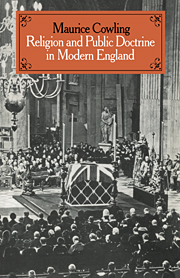Book contents
Summary
‘The classes that represent civilization, the holders of accumulated capital and accumulated thought, have a right to require securities to protect them from being overwhelmed by hordes who have neither knowledge to guide them nor stake in the commonwealth to control them.’
Lord Robert Cecil (i.e. Salisbury) English Politics and Parties in Bentley's Quarterly Review March 1859 p. 29.‘These men who preach freedom to us have no real desire for it in its literal sense. The protection of each individual human being from more interference than is indispensably necessary to protect the freedom of his neighbours, is what we used to understand as the meaning of freedom. But it is not the object which is prominent in the wishes of the Radicals of the present day. Their political ideal more nearly resembles one which is usually spoken of as antiquated, but which is antiquated only in the particular form that it assumed. They believe in a divine right; they uphold a legitimacy; they teach an unquestioning obedience; they look upon force as a legitimate weapon for the propagation of the faith. But their divine right is the right of the multitude; their legitimacy enthrones the majority; the unquestioning obedience which they require is to the decree of the ballot-box; the faith which they do not shrink from propagating by force, is the sentimental pseudo-religion which, in this nineteenth century, has so widely usurped the place of faith.’
- Type
- Chapter
- Information
- Religion and Public Doctrine in Modern England , pp. 361 - 388Publisher: Cambridge University PressPrint publication year: 1980
- 1
- Cited by



